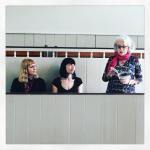Jan Carson's Blog, page 5
October 16, 2018
In Praise of Slim Volumes
[image error]
There’s a quote from Jenny Offil’s excellent Department of Solitude which sums me up pretty neatly. “Three things no one has ever said about me: you make it look so easy. You are very mysterious. You need to take yourself more seriously.” Amen. Amen. Amen. You have me down to a tee Jenny Offil. Might I take the liberty of adding a fourth “thing no one has ever said about me: less is really more with you?”
I am such a more person. I have too many shoes, too many books, too many strings of red, plastic beads. I talk too much. I cram too much into every day. And, when it comes to writing, I’m a chronic over-writer. It is not uncommon for me to find myself hacking ten or even twenty thousand words off a manuscript just to bring it down to a cartable weight. (Let me put that in context folks. That’s an entire poetry collection. Five if you only write haiku). I am very, very grateful to have had a string of incredibly patient editors, all capable of hacking ten percent off a novel in the most gracious manner..
I am in awe of those writers who manage to write sparse, minimalist prose and simple, well-structured plots; who are able to come in well below the word count and still pack a mighty punch. I look at their books in the same way I look at people who have all-white houses with no junk on display, and I wonder, how on earth did they manage that? What is wrong with me? I feel like a localised explosion in comparison. I aspire to write less but better. (I’m not sure that’s even grammatically correct. It doesn’t sound right. Editors? Help).
For years now Carys Davies has been one of my favourite small, but perfectly proportioned writers. I first discovered her short story collection The Redemption of Galen Pike, and read backwards and forwards from there, thoroughly enjoying her latest novel, West, (it’s definitely a novel in scope, albeit packaged in the guise of a novella). I’m on my fourth re-read of Galen Pike and it remains one of my all time favourite collections, partially because the stories are dynamite, partially because it’s so slim you can fit it in your shirt pocket and still have room for a packet of polos. Davies’ stories are neat, tightly packed works of great beauty. Her sentences are scalpel sharp; her characters, perfectly drawn. She can deliver a well-timed plot twist better than Stephen King. AND she regularly brings her books in below the one hundred and fifty page limit I hold as a kind of benchmark for greatness. (NB. I hold 90 minutes in similar standing when it comes to films). I’m reasonably easily pleased. If I can enjoy a complete and satisfying read in the time it takes to get from Central to Connolly then I’m a happy camper.
I spent some time with Carys during this year’s Eastern European Short Story Festival in Croatia. Unsurprisingly she speaks with wonderful precision and insight about her writing. She reads beautifully. She also has some of the most amazing frocks I’ve ever seen and is very good fun. Tomorrow evening I’m delighted to be hosting an in conversation with her in No Alibis Bookstore. It’s part of the programme for this year’s Belfast International Arts Festival. We’ll be talking about West and short stories and how Carys’ writing has developed from book to book. We’ll most certainly be discussing precision too. I don’t care whether this interests the audience or not. I’ll be asking for my own benefit. It’s one of the perks of being an interviewer. I’m going to ask her how to write less and say more. I’m pretty sure she’ll have something wise to say.
In honour of Carys Davies day I’ve compiled a quick guide to my fifteen favourite very short works of fiction. It was really difficult narrowing this list down. A few of my favourite reads fall just outside the 150 mark. I was also tempted to add in some great slender volumes of non-fiction, (Virginia Wolff’s A Room of One’s Own, Ben Lerner’s The Hatred of Poetry and Annie Dillard’s The Writing Life, all of which are well-thumbed regulars on my bedside table). I have avoided poetry for most books of poetry fall below the 150 page limit, (imagine -she says with horror- if poetry collections were routinely 150 pages or even longer). Instead I’ve stuck with fiction: prose, short stories and micro-fiction, because these fifteen books are all amazing and, despite their brevity, guaranteed to satisfy even the hungriest reader. I recommend reading on train journeys of around two hours, by the fire with a nice bottle of wine or in bed, of an evening, with a pot of tea. I hope you enjoy them as much as I did.
[image error]
Carys Davies – The Redemption of Galen Pike. The perfect place to start your love affair with Carys’ writing. Opening story, The Quiet is a masterclass in building up tension. There’s not a single clunker in the collection.
Raymond Carver – What We Talk About When We Talk About Love. All Carver is holy but What We Talk About is particularly holy and testament to how stories can emerge sleeker and stronger from a really harsh edit.
Sarah Moss – Ghost Wall. Sarah Moss writes so well about the dynamics within families and here she’s pared her story right down to the bones of the relationship. There’s not a single ounce of flab in this wee novella.
Richard Brautigan – Trout Fishing In America. What is it? A novel? A short story collection? Prose poetry? I don’t really care. It completely changed the way I look at language. My copy’s held together with yellowing bits of Scotch tape and leaking pages, it’s been read that much.
Frankie McMillan – My Mother and the Hungarians. I usually find micro fiction a little unsatisfactory, but these tiny stories are so rich and filling, I never feel cheated when I dip into this collection.
Francois Sagan – Bonjour Tristesse. Here began my love affair with French literature and lens flare. Nothing much happens but it doesn’t happen in such an elegant fashion.
Edward Gorey – The Unstrung Harp or Mr Earbrass Writes a Novel. After reading this I felt much better about my own shitty attempts to be taken seriously as a writer. It is good to laugh at yourself sometimes, especially when someone else has gone to the effort of writing down all your ridiculous exploits and illustrating them in such a charming fashion.
Ernest Hemingway – The Old Man and the Sea. Though it does make me feel very thirsty every time I read it, this is the only Hemingway I actually like. I do like it a lot though. I no longer feel the need to apologise for this.
Claire Keegan – Foster. Claire Keegan terrifies me. Her writing is so sharp and so good. Reading her is like reading what God would write if God was Irish and inclined to write rather dark short stories. Afterwards I sometimes feel like there is no point in writing. (See also Marilynne Robinson and George Saunders). I also love the fact that this is just one very long short story. We should have more long short stories nowadays.
Muriel Spark – The Driver’s Seat. I hear Muriel Spark wrote all her novels perfectly on the first attempt. This should make me hate her. But I don’t. Muriel Spark is one of the best things Scotland ever produced, (see also, Del Amitri and Highland Toffee), and this is my favourite of all her books, (or at very least, the half dozen I’ve read).
Henry James – The Turn of the Screw. The ultimate in creepy stories. I’ve been trying for ages to write disturbing short stories where you can’t actually put your finger on why it’s so disturbing. It turns out they’re exceptionally difficult to pull off. Here, James makes it look effortless. Bastard.
Joy Williams – 99 Stories of God. They’re not all about God, but there are 99 of them and they’re tiny and brilliant. Perfect for keeping on your bedside table and mulling over before you fall asleep.
Bernie McGill – Sleepwalkers. I love Bernie’s novels but I really love her short stories. She has a masterful way of getting under her character’s skin and I particularly enjoyed the slightly weird ones in this collection.
Shirley Jackson – We Have Always Lived in the Castle. Merricat and Constance Blackwood are two of my all time favourite characters and this is such a deliciously dark little book. Beware it is like a gateway drug. You’ll not be able to keep yourself from diving head first into Shirley Jackson once you’ve read this.
Samantha Schweblin – Fever Dream. It’s odd. It’s disturbing. It’s perfectly written. It literally had me frozen to the seat for the entire duration. It’s a strong contender for the best book I’ve read this year.
October 11, 2018
Happy Birthday Old Friend
[image error]
The QFT turns fifty this month which means I’m celebrating my twentieth year of friendship with this Belfast icon. It would be shameful not to to mark the occasion. We’ve been through so much together. I’ve mentioned this many times before but the QFT is the place I retreat to when I want the world to go away and leave me alone for approximately 90 minutes, or two hours max. I’ve arrived at the QFT on the verge of tears and cried all the way through the movie. I’ve come in my pyjamas. I’ve snuck in with a bottle of Merlot hidden in my anorak sleeve, (though not lately, now you can legally take your drink in with you). I’ve come with friends. I’ve come alone. I’ve recently brought my niece and nephew for the very first time, and though they squirmed throughout and consumed their own body weight in Haribo, it is my hope that they’ll remember their first visit and still be coming twenty years from now. I’ve made some wonderful memories in the QFT.
I recall the night I cried so hard during a screening of My Life Without Me, a complete stranger scooted down the aisle to give me a hug and remind me the movie wasn’t a true story. Also the night, whilst nursing a stinking head cold, I sniffed and snuffled loudly through Holy Motors, pissing everyone off in a three seat radius, until a strange man, came striding across the aisle to offer me a Kleenex. I recall an awkward outing to the original Battle Royale with a very squeamish friend, and the annual repetition of It’s A Wonderful Life, which will always mark the beginning of Christmas proper for me. Magic moments all. More so, the last few years when I’ve been able to host Dementia Friendly Screenings at the QFT, catering for a bunch of wonderful people who’d otherwise struggle to access cinema. I also thoroughly enjoyed last year’s wonderful older people’s project, recording short film trailers with local seniors across Northern Ireland, (you haven’t lived ’til you’ve made a Jaws trailer with three octogenarians who’ve never seen Jaws). A lot of my best times have taken place in the QFT and, over the years, I have it to thank, for introducing me to most of my favourite film directors: Lynne Ramsey, Wes Anderson, Hal Ashby, PT Anderson and Terence Malick, whom I’ve fallen in and subsequently out of love with whilst sitting at the back of Screen 1.
I literally spend more time in the QFT than I do in my living room. (Nb. this sounds like an exaggeration, but having no TV and rarely going home except to sleep, I mostly just pass through my living room in pursuit of some book or other. In fact, last week, I did a quick tally of how many time I’ve sat on my sofa since purchasing my house two years ago, and the answer was eight. Eight times total. I’ve probably sat on the inside seat of Screen One, three rows back on the left hand side, eight times in the last mont alone. It is my favourite place to sit). I’m grateful to the various people who’ve worked in the QFT over the last twenty years, none of whom have ever made me feel tragic for seeing two films back to back on a Sunday evening, entirely alone. The difference between the QFT and the other, more commercial cinemas, isn’t just the programming, (which is fantastic), it’s also the hospitality and genuine welcome offered by everyone who works there.
I first encountered the QFT as a nervous undergrad back in 1998. Those were the days of the back alley entry, tickets that looked like raffle tickets and not being able to book online, so sometimes you queued in the rain only to find a film sold out by the time you arrived, sodden and shivering, at the top of the line. Coming from Ballymena where I mostly grew up, between the years of the State, (was ever there a more aptly named cinema?), burning down, and the new omniplex arising from the ashes of the Leisure Centre car park, I had to rely upon the four screen in Antrim for most of my cinema education. It wasn’t what you’d call extensive. Sorry, I lied. During and after the State we also had Spectrum Video too. Spectrum was one of those old school video rental places with an entire wall of moulded plastic shelves. You could tell when a movie was already on loan because it has a little yellow triangle tucked into the sleeve. The Herbie movies were always on loan. They were very popular in Ballymena.
Suffice to say, I arrived at Queen’s in 1998 with a complete understanding of James Bond, Tom Hanks and Goldie Hawn and little to no knowledge of anything even vaguely arthouse. Reality Bites was my favourite movie, Steel Magnolias was the most profound thing I’d ever encountered and I’d never even seen Jaws, (still haven’t). Last year, I spent some time chatting to people who’ve also had a lifelong friendship with the QFT and almost all of them had similar stories. They pointed out that, before the era of Netflix and online accessibility, it was the only avenue they had to access non-mainstream movies.
Like me, many regulars, encountered cultures and stories beyond their own experience, for the first time in the art house films and carefully programmed world cinema the QFT screened. I can’t even begin to say how grateful I am for this service. I became both better informed and more curious about the world beyond Northern Ireland, because of all my wasted evenings at the QFT. I encountered ethnic, sexual, socio-political, gender and cultural experiences I’d never come across before, on screen at the QFT. I’d like to think these movies made me a more empathetic person for it’s almost impossible to empathise with another’s experience if you’ve never encountered it before. I fell in love with storytelling through the films I saw at the QFT. They began conversations with the books I was reading and the people I was starting to meet and slowly, over a decade or more, they began to draw the writer out of me. I don’t know that I’d be so obsessed with story, if I hadn’t had the QFT as such a constant resource during my most formative years. I can’t imagine how I’d shape my weeks if it wasn’t there.
And so, I’d like to say happy birthday to a very good friend, one of the oldest friends I have in Belfast. I’d like to express my thanks for all the ways the QFT has served me well these last two decades, and served our city well over fifty years. I’d like to wish her fifty more brilliant years and a revival of both Northern Irish cinema going and Northern Irish cinema making. And I’d like to encourage everyone who calls Belfast home to make the most of this incredible resource and -by attending screenings and buying memberships and purchasing drinks at the bar rather than smuggling wine in, in your sleeve- ensure we have the QFT for many, many years to come. Happy Birthday old friend, you don’t look a day over 21.
September 26, 2018
On Becoming a Tooth Grinder
[image error]
Short of recording myself sleeping I’m not sure how to verify this, but I’m pretty sure, I’ve started grinding my teeth. I wake most mornings with a dull, throbbing pain in my upper left jaw. I have headaches which last until just before lunchtime and when I press my tongue against my molars on the left side, it feels as if they’re more worn down than their colleagues on the right. I have never, as far as I know, been a tooth grinder before, and so this realisation comes as a bit of a surprise. I’ve always assumed that people who grind their teeth are stressed out individuals. However, putting aside those universal fears around the collapse of the nation and the world as a whole, I don’t feel more than normally anxious about anything right now. I’m not under any more pressure than I usually am. In fact, when the tooth grinding began, I was about to go gallivanting round North America on a two week holiday. I walk. I eat vegetables. I get almost eight hours of sleep per night. I go to the gym and run in a strange lopsided fashion whilst watching daytime television with the subtitles on. I do not feel like a stressed out individual. Still I can’t avoid the fact that I have become the sort of person who grinds their teeth while sleeping.
For a long, tender-jawed, week I considered the fact that because I am now a tooth grinder I am most likely also stressed. Stressed out people are meant to be constantly worrying about things. I wouldn’t say I’m a worrier. If you asked me am I happy? Do I have a good life? Am I particularly fearful? I’d say yes and yes and not really. And I’d probably add that at least once a week I find myself filling up, in a good way, thinking about just how fortunate I am, (mostly when I’m working with my older people). I’d be telling the truth when I said all of this. I don’t consider myself an anxious person. But lately I’ve found myself stuck in these little loops of thoughts which can only be classified as anxieties. When I’m on my own for long periods of time, (and how else am I meant to write books), these thought loops seem to become more constrictive, insistent and difficult to shake off. There is a way of tying a person up with a certain kind of knot which gets tighter the more the tied up person tries to struggle against it. It’s not the kind of knot they teach you in Scouts, but it’s a good image for how I feel when the mean thoughts start chipping away at me.
I’m guessing I’m not the only writer who gets herself into these loops of anxious thinking. But just in case I am, here’s how they usually manifest themselves for me. I’ll be tired. I’m never at my strongest or more sensible when I’m physically worn out. I’ll go on Instagram or Facebook or Twitter. I’ll pick up a literary journal. I’ll happen to glance at the best sellers’ chart, or the staff picks in Waterstones. I’ll overhear two other writers, talking at a book launch. Hell, I can get anxious, just going to a book launch. I’ll hear that some other writer’s won a prize, or been shortlisted for a prize, or is talking, in glowing terms, about somebody else who’s won a prize. I’ll read someone’s story online, or in a print journal. I’ll go as far as buying their book in hardback. Even though I can’t afford to buy it in hardback I will, because I’ll feel compelled to read this book straight away, long before the paperback version’s available. Inevitably it will be the sort of book everyone else is touting as the best book of the year/decade/century. I will not like it or I will like it too much. Both responses can be equally devastating when I’m anxious. I will go to bed and wake up in the middle of the night, (probably grinding my teeth), and thinking about other writers. This is where my problems always begin.
My anxieties aren’t particularly rational. If another writer writes a book I think is amazing, I will kick myself because I am not as accomplished a writer as they are. (Nb this feeling is always magnified when the writer is significantly younger than me). I’d like to say this feeling is straight up jealousy, but I’m far too self-absorbed for jealousy. I simply feel myself shrinking in the presence of what I’ve come to think of as “serious writers.” If another writer writes a book which everyone loves except me, I will kick myself because I cannot write the kind of books people want to read and award prizes to. No matter how hard I try to write about other, more pressing matters, all my stories seem to emerge as stories about flying children and old people coming back from the dead. I don’t even like reading the right sort of books. I make myself read them but I’m usually wishing I was reading Agatha Christie instead. Mostly, I feel as if I’m missing out on what everyone else sees in these books.
Then, I will wonder what is wrong with me. Let me tell you, it is a bad idea to start asking yourself what is wrong with you, in the middle of the night, when you have anxiety-induced insomnia. Some of the things you come up with will not even be genuine character faults, (for example, trying to avoid talking on the telephone and not liking markets). Inevitably I will end up running through the enormous list of issues I am aware of, and trying to fix, in my own writing: overuse of semicolons, failure to write satisfactory endings, inability to create convincing female characters, (special thanks to that one man, who told me, I was a poor excuse for a feminist because I always wrote male characters), overuse of the words “thing” and “loud,” and the fact that I am still not entirely sure what an adjective is. I will be wide awake by this stage and considering two options for what I should do next. I will either give up writing altogether and become a historian or, first thing in the morning, I will enrol myself in some sort of creative writing programme for beginners. Recently, I have also felt the desire to email my publisher at various godawful hours of the night to ask if they would mind not publishing my novel after all because I don’t want anyone else to read it. I don’t want people laughing at me.
I’m being facetious. But, if I’m honest, some version of all these thoughts have passed through my head in the last month or so. I fluctuate daily between an unshakeable belief in my own genius. “Just wait ’til they read what I’ve written, then they’ll give me all the prizes,” I’ll think, and five minutes later, honestly believe I can’t string a sentence together. Over the years various people have told me that I can’t write for biscuits whilst others have told me, (and I employ a direct quote here), that I am, “quite frankly the most important thing to happen to Irish literature in the last century.” (Nb. the speaker did not clarify whether they meant the last century i.e. post millennial, or the last hundred years, which would take in Joyce, Beckett and about two thousand Irish writers more significant than me). Just last week a man came the whole way across the room after an event for the sole purpose of telling me, he’d bought my book and didn’t enjoy it at all. I quote these examples to highlight the fact that most of us are constantly being told we’re wonderful or completely untalented. There’s rarely a happy medium. It’s hard to have a sense of how good your work actually is when no two readers respond in the same way. It’s no wonder I’m grinding my teeth. I feel like I’m waiting to run the same gauntlet of responses when the new book comes out. It’s a little like bracing yourself to have your hand slammed in a car door. I remember this sort of thing happened before. Between book number one and book number two I went -what I later came to call- a bit wobbly. Then it happened again, just before book number three. I’m no psychiatrist but I’m guessing there’s a pattern emerging.
For writers, the space between books is a particularly vulnerable one. What do you do when you don’t have a book out? You wait on a bed of self-imposed nails for the critics to get the hold of it. You try to grow a thick winter skin in preparation. You go to festivals and read from old work. It doesn’t even feel like it belongs to you anymore. Someone else wrote it. A better, more confident writer. You talk about writing. You lead workshops trying to teach other people how to write. You wonder why they’ve paid good money to listen to you. Half the time you feel like a great big fraudster. If only these people who are drinking in everything you say could see how insecure you are about your next book, or know that you haven’t written a bloody word since the last book came out. They’d not be chortling along with your anecdotes and tolerating your long-winded explanations of where you get your ideas fro, if they knew you’re absolutely terrified your next book won’t be as good, or well-received as the last one, or the one before, which, let’s be honest, is the one everybody really loves.
Above is a photo of a sculpture of Jesus being crucified which I saw at Milwaukee’s Art Museum last Thursday. This is how I feel every time I do an author event at the minute. One of my faces is looking at the audience. This face is all smiley and professional. It is holding its shit together. The other face is looking over my shoulder, freaking out a bit, desperately trying to see where the next book’s coming from, wondering what people are going to say once they’ve read it. I’ll say it again. It bears repeating. I know publishing a book’s not like going off to war or being crucified, but it’s stressful enough. I’m not that surprised I’ve started grinding my teeth. I’ll bet half the writers I know are secret tooth grinders. Perhaps, there’s a market to be had in literary themed mouth guards with little quotes from Jane Austen and Ernest Hemingway tattooed into the rubber.
I’ve quit grinding my teeth while I’m on holidays. I’m going to put it down to resting properly and turning my out of office on, putting a little distance between myself and social media. This isn’t a self help blog. I don’t have any good suggestions for how to pull myself out of these loops when they start. I know rest, exercise and a good writing regime definitely helps. I also know comparing myself to other writers is a really dangerous path to go down. Nobody writes like anybody else, (except maybe, that woman who does the Poirot spin-offs. She’s made her name writing like AC). Trying to work out why one person got a prize, or an agent, or a publishing deal, and you didn’t, is like trying to work out why some people like orange fruit pastilles better than the red ones, (probably something to do with faulty taste buds).
I know it also helps me get over myself when I make a concerted effort to enjoy other people’s work. It’s strange how telling someone else -even a Twitter-only friend- that you really appreciated their book or story, seems to make you feel a lot healthier about your own work. I firmly believe in the concept or artistic community. I want to be someone who is genuinely pleased for other friends’ successes even when I’m having a bit of a desert period. I know, in my head, that success isn’t a limited commodity. There’s plenty of it for all of us and actually supporting each other’s work seems to increase our capacity for success. But sometimes, it just seems easier to sit at home feeling rubbish about yourself and eating Doritos.
Maybe, let’s not do that anymore. For me, anyway, it just spirals into a big loop of tooth grinding anxiety. I’m going to try and be more honest when I’m having an insecure moment. Quite frankly I don’t have the capacity to make it through another round of book promoting with both of my faces pulling in different directions. I can’t get up on stage and pretend to be the most significant thing that’s happened to Irish literature in the last century. Because I’m not. No one writer is. I bet they all had insecure, ugly moments and terrible first drafts and shite reviews in The Guardian. It’s a mess trying to juggle success and disappointment, creativity and exhaustion, ego and that little voice which is always -even when you have the big prizes ranged across your mantelpiece- going to tell you, you’re nothing but a terrible fake. I think the best we can aim for is honesty. I’m happy to be honest about my anxiety, if it means I don’t start grinding my teeth again the minute I hit Irish shores.
I saw an amazing exhibition at the Toronto Museum of Contemporary Art this afternoon. The artist had used a series of video installations to explore the political and social implications of classic cartoons. Bugs Bunny. Road Runner. Mickey Mouse and the like. Apparently the first law of cartoon physics states that “any body suspended in space will remain in space until made aware of their situation.” You know what he’s talking about. It’s Wiley Coyote treading thin air over a ten thousand foot drop, capable of motoring on until he looks down and realises there’s nothing beneath him. It’s amazing how far you can go if you don’t let self-consciousness come into play, if you refuse to notice just how high up you’ve managed to get. It’s not blinkered thinking. It’s brave and focused and very much determined to keep on keeping on. It’s not as if you have any other options when the only way is down. I think I’m going to be employing the first rule of cartoon physics quite a bit in the next few months.
September 20, 2018
Travels Without Charley or How to Holiday Alone and Not Feel Tragic.
[image error]
Even though you are on holidays make a rough schedule of small goals which you’d like to achieve during each day. For example, getting up and eating something which has not been purchased in a coffee shop. Otherwise you may find yourself living the real life equivalent of that once scene in Frances Ha where Greta Gerwig goes to to Paris for 48 hours and sleeps through 36 of them.
Always have a book to hand. When you are feeling lonely or, worse still, feel like you might look like you are feeling lonely to those around you, you can read your book. It will give your eyes something to do which is not crying. It will give you the appearance of a seasoned solo traveler. Bill Bryson for example, or the Littlest Hobo, if he was not a dog.
Never order the burger. It is impossible to eat a burger one-handed without looking like a savage and you will require at least one hand with which to hold the book you’ll invariably be reading whilst dining alone. You may try to wedge said book open with the lip of your plate, or use your cutlery to weigh the pages down. It will not work. You will find yourself dripping ketchup all over the book, or awkwardly attempting to hold it open with an elbow or chin. There is no reading pleasure to be had whilst eating a burger. Trust me. I’ve tried. (See ketchup-smeared copy of Sally Rooney’s Normal People). Chips are perfectly safe however, and all manner of eggs. Basically anything that can be eaten with a single fork, turned sideways, like an American.
Before leaving the privacy of your hotel room or apartment talk to yourself, out loud, for at least a minute. This will save you the embarrassment of hearing your voice crack as you say your first audible words of the day to the Dunkin’ Doughnuts employee who takes your mid-morning coffee order.
If you are going to purchase a million books it is best to wait until you have reached the final destination of your trip before buying these books. Otherwise you will have to physically haul them everywhere with you. On a related theme, when traveling alone it is perfectly acceptable to wear cargo pants, army vests and combat jackets. Heavier items can thus be secreted about your person, balancing out the load like a kind of human Buckaroo. Do not resort to purchasing a Kindle. They are not “handy for when you’re traveling.” They are the physical embodiment of dead bookstores.
Always talk to old people. Any old people. Even when you’re in Sweden or Croatia and don’t speak a word of the language. In such situations, nodding and smiling effusively, whilst the old person continues to talk at length, will still make for a heart-warming experience. If old people give you edible items -such as apples or sandwiches- always accept these items, though it is probably best not to consume them if they’re already unwrapped. Do not give your phone number to old people you meet on buses.
Never assume it will be ok to leave your enormous suitcase, just for a second, while you nip to the bathroom. Therein lies the genesis of a bomb scare. (See Minneapolis Grayhound Station circa 2015). Instead drag your enormous suitcase into the bathroom stall with you and learn how to pee sidesaddle in the two inches of space you’ll have left.
Stride purposefully everywhere you go, even if you don’t know where you’re going. If forced to consult a map, lock yourself in the toilets before doing so. This way no one will know you are a tourist. It is your ultimate aim when traveling solo, to avoid looking like a tourist at all costs.
Invest in a pair of statement sunglasses, (See two euro yellow plastic number purchased from Penneys in May 2018). You will be surprised, perhaps even delighted, by how many complete strangers will instigate conversation with you by commenting on your statement sunglasses. (Four so far, on this trip, and I’ve only been traveling for four days).
Unless you specifically want everyone in the bus/pub/line at Target to tell you about their Irish ancestry, never mention the fact that you are Irish, or Northern Irish in public. Nb. Most Americans will not be able to distinguish between the two. Those who can, are likely to have once done a black taxi tour of West Belfast and will consequently offer their ten cents of, mostly misguided, opinions on the subject. (See Portland bus circa 2009 when I was grilled about the potato famine -was it a famine because there were no potatoes to eat, or because the people only had potatoes to eat?- for one hundred and twenty, very painful blocks).
Always ask a local for advice on where to eat, drink and buy your books. Make sure you write the actual name of the places they’re recommending down. Otherwise you will have some fun trying to locate “the place with the sort of swirly sign out front that does good Sushi,” on Google maps.
Do not enter empty restaurants. It does not matter how good a review it got on Trip Advisor, eating alone in a restaurant with no other diners is the restaurant equivalent of being trapped in a lift with a complete stranger. (See also, staying in hotels with no other residents).
Always remember that “table for one,” is secret restaurant code for, “do you have a separate room where I can be seated all by myself, ideally in a corner, facing a wall, so I might spend the entire evening being ignored by the server as my stomach slowly consumes itself.”
Take advantage of the fact that you will probably be paying the same room rate the hotel charges for two people by lying sideways across your enormous football pitch-sized bed, and using every tiny bar of soap they’ve left in your bathroom.
Tapas is not really a concept which works for the solo traveler.
If, at any point in your travels you find yourself beginning to feel a little lonely, stop and remind yourself of all the unpleasant things you would have found yourself partaking in if you were traveling with another person who did not share your, undoubtedly, faultless sense of taste. (At such times I like to imagine myself eating in the Olive Garden, being dragged round a Georgia O’Keefe exhibition, browsing for books in Barnes and Noble or doing one of those open top bus tours. This is always enough to make me appreciate my own company).
September 10, 2018
Ending Well
[image error]
I lost another one of my project participants yesterday. This year alone, three of the older people I’ve been working with have passed away. It’s been a good year. In 2017 I had to say goodbye to six of my wonderful new friends. It’s never easy.
I absolutely love my job. For me, creating art with older people is right up there with my own writing practice. Most days, if I’m honest, I’d prefer to hang out with my older people than write. They’re not as demanding. They don’t make me feel like a failure when I’m having a less than productive day. I’m supposed to be inspiring them, but usually it works the other way round and I leave a session buzzing with the encouragement they’ve offered me, the ideas discussed and amazing pieces of work we’ve managed to create together.
I really enjoy working with older people. But there’s a downside to my job. The people I work with are old. Some are almost a hundred. Most are in their late seventies at least. I’m not naive. I know I have a limited amount of time with these people. But no matter how elderly they are, it always comes as a shock to realise I’ll never again see a wee face I’ve grown to love. I’ll never get to pick up the conversation where I’ve left off; or complete the project; or watch that person light up when they encounter the finished product for the first time. One week they were here drinking tea and writing stories, dancing, painting, telling me all about their childhood or their grandchildren starting school. The next week there’s an empty chair. The week after, another older person’s taken their place and I’m expected to offer them the same amount of welcome and enthusiasm I try to bring to every older person I work with. Sometimes it’s hard to work up the energy for it.
I’m not over-estimating what I do. What I do is easy compared to what families and carers do. I rock up once a week for ten weeks, or six months, or a year if I’m lucky, and I do fun things with older people. I get the best of them for a couple of hours. I listen to their stories. I write with them. I sing with them. Sometimes we even dance. I drink endless cups of tea and help them create little pieces of art which, hopefully, remind them that there are still things to be tried and enjoyed in this life, that each of them is still full of untapped potential. I try to make friends with them, even if we’re only going to have a couple of months together. I have two hours a week with my older people. It’s not very long. You can hardly scratch the surface of a person in two hours a week.
I don’t get the hard bits: the temper, the harsh words, the forgetting, the physicality of caring for a person who can no longer take care of themselves. I don’t have to watch a person I’ve known for years, slowly fade away. I get smiles and laughter and the first listen of the stories carers and family members have no doubt heard a thousand times. When I occasionally get tears, they’re the good kind of tears: the sort which spring from memories recollected or powerful words deeply felt. I don’t get to know my older people as their partners and children and carers know them. We only go back so far. Our friendship is tied up in whatever project or activity has brought us together. I could tell you which songs they like to sing, which colour of paint they’ll almost always reach for, their favourite film or place to visit, how they take their tea, but I probably couldn’t tell you their second name. When I lose them, my loss is nowhere near as large as the loss their family and friends are experiencing. But it hurts to lose them nonetheless.
Sometimes the losses makes me a little reluctant to throw myself into the next friendship with an elderly participant. It’s not something we often talk about, but many of the community arts practitioners I work with, will know exactly what I mean. If you work with older people, you need to prepare yourself to lose them. But you also need to ensure you don’t bring any kind of fear or hesitancy into your work. Understanding that your friendship with an older person might be reasonably fleeting, must not stop you from fully engaging with this person. If, as a community arts practitioner, you hold yourself at a distance from your participants they’re inevitably going to have a lesser experience of whatever you’re attempting to share. More worryingly however, you’re not going to learn as much as you might have learned from your participants. You’re less likely to leave the project shaped and changed by the people you’ve encountered and the incredible learnt wisdom, older people always seem to impart.
Which begs the question, how, as an older people’s arts facilitator do you keep going, how to do you remain open to new encounters with your participants, how do you keep smiling and loving what you do, when you know you’re going to continue to lose the people you’ve grown close to? For me, the answer to how is always why? Why do I work with older people? There are so many selfish reasons, many of which are listed above. Mostly I work with older people because, in my experience, they’re constantly inspiring, challenging and encouraging me, both as an artist and a human being.
However, if I set aside my own ulterior motives, the main reason I work with older people is because I want the final years of their lives to be filled with as much joy, contentment, creativity and passion as possible. I’ve had older people I love -family members and friends- who, through circumstances, lack of resources or illness, haven’t enjoyed the kind of end of life experience they deserved. This doesn’t seem fair to me. I know it’s hopelessly naive, but I’d like to ensure that everyone gets to end well. I’m prepared to do whatever I can to make this a reality for the people I work with. It’s the only way I can seem to make sense of the loss. So, when I think about my lovely six month friend who passed away yesterday I’m a little sad, but I’m much more grateful to have been a tiny part of her final chapter. My last memory of her is full of laughter and stories and confidence. Neither of us knew she’d only have a few days left, but there she was trying and succeeding, quite elegantly, at an art form she had no previous experience of. She was, in her last moments, contributing something meaningful to the world. Creating beauty. Enjoying life. Ending really well.
August 15, 2018
On Holidays
[image error]
“Although I will point out that I am currently On Holiday, rather than Working, being On Holiday is something that I am very bad at and rarely try. As far as I can tell, it involves not really knowing anyone, paying your own hotel bill and lying in bed in the evening, typing, just as you would at Work.”
AL Kennedy
This week I am on holidays. I’ve turned my out of office on and am resolutely trying to ignore the very many, increasingly urgent, emails piling up in my inbox. I am swimming. I am reading books I actually want to read rather than the usual stack of less-than-appealing things I’m meant to be reading for interviews and research. I am eating ice cream, drinking cocktails, turning a furious shade of sausage pink and hoping to progress towards freckled by the week’s end. I am sleeping more than I usually sleep. I am even napping a little through the day. In short, I am resting. But, I am still writing. Two hours per day. One thousand words per sitting. On the balcony, in the coffee island of a Spanish mall, at the departure gate in Aldergrove. Any moment where I can find the time and enough battery life on the laptop, I’ll be ploughing away at the next novel.
In one sense, I’m addicted. I’m writing because I’ve just hit the 40,000 word mark which, for me, is the point where a set of characters, a setting and a nebulous idea of how the two relate, begins to consume my every minute of thinking. Right now, the fictional people who inhabit the fictional village of Ballylack in the not-so-fictional summer of 1993 are just about as real to me as the people who actually live next door and pass me every day in the street. To ignore them for a whole week would be a kind of estrangement. Or extreme rudeness. I thought about taking a holiday from this book and then I realised how pointless and needlessly distressing this would be. I’d only think about the stupid thing even more. I’d feel constipated with ideas and scenarios. I’d spend the whole week with separation anxiety. So, I decided to keep writing even though I’m meant to be on holiday.
Now, I know those of you who know me well are pulling your hair out at this point. I’m far too busy. I’ll be the first to admit it. It’s early August and I’ve already purchased my 2019 desk diary and it’s beginning to fill up at an anxiety-inducing rate. When I said I was off to Spain for a week, lots of you said, “good woman. Lie by the pool. Sleep. Turn your email off and DO NOT be writing anything.” Your concern is noted and appreciated but, in all honesty, I can’t think of anything worse than a whole week of not writing. It wouldn’t feel like a holiday at all; more, a form of penance.
I’ve just finished reading AL Kennedy’s, On Writing.It’s still a little soggy round the edges from where I’ve been dipping in and out between swims. It is a marvellous little book, funny and full of heartening honesty about what it’s really like to be a grafting writer. Kennedy’s open about the highs and lows of the writing life, “my work is lovely,” she writes. “So, I do it too much and sometimes get ill.” Amen. Me too. Kennedy writes with searing honesty about the incessant grind of traveling alone from one highly social reading experience, via solitary trains, planes and automobiles, to another incredibly social experience, fuelled only by service station coffee and biscuits. She is, more often than not, ill, or at best recovering from an illness, and admits that, even in the slower times, “even if you’re entirely well- putting one word in after another is impossibly tiring.” Amen again. I can never understand how sitting in a chair for two hours per day, working little more than my mind and five fingers total, (I’ve just counted how many digits I actually use when typing), can be so incredibly draining, I often begin to drift off while sitting at my keyboard.
Still, again and again, AL Kennedy returns to the positive aspects of writing. The sheer good fortune of making a living from something you actually enjoy doing. The impact, (sometimes even positive), which your writing can have on those people who chance to read it. The power you wield when you employ strong words, correctly ordered. She summarises it like this, “I know that in my life the truth is that I have been allowed to do something that I love. Doing this allows me to love better and more, to know what makes me happy and to be alive in more and better ways.”
After fifteen years of consistently tapping out stories for two hours per day, I know what makes me happy too. Writing makes me happy. Writing feels like resting for me, or breathing deeply, or relaxing, or having a little down time. Whatever way you choose to phrase it, it wouldn’t be a holiday for me if I didn’t get to write. Even after a decade and a half in this business making up stories still does not feel like a job. It continues, (most days), to feel like a treat. And, while the admin can gladly take a back seat this week, I wouldn’t even consider depriving myself of the one activity which consistently makes me feel most like myself. So, dear concerned friends, thank you for your concern. It is appreciated. It may not look like rest to you, but I am feeling a little less weary with every hour spent scribbling away in the sun.
I have also recently re-read Stephen King’s book On Writing, (it may appear as if I am reading an exorbitant amount of “how to be a writer” type books at the minute but I am currently teaching an awful lot of creative writing workshops and I want to make sure I’m not feeding my students a bunch of half-baked nonsense). King’s book is equally challenging, and reassuring, though slightly intimidating. The man must be churning out 5,000 words a day to produce that many books. There’s a very heartening section in On Writing where King says, (and I paraphrase here, for my copy is back in East Belfast), “I tell people who ask, that I write every single day except Christmas and my Birthday. I am lying. I always write on my birthday as well.” Me too, Mr King. I can’t help myself. I usually manage to sneak in a wee post-turkey session too. Not that I’m trying to be competitive or anything.
July 12, 2018
…Ten Years Later
[image error]
Ten years ago I received my first payment for a short story. At this point I had been writing seriously for about three years. I’d had a couple of stories published online, but had yet to make any money at all from writing. I was pretty delighted to finally see one of my stories included in a print journal, but as you can see, I never cashed my first payment cheque. I framed it instead and hung it over my writing desk, partly because I’m sentimental and partly because it would have cost more than the three bucks, I’d earned, to cash the bloody thing.
Yesterday, I had some pretty exciting news to announce. My next novel, The Fire Starters –a magic realist romp through East Belfast during bonfire season- will be published by Doubleday, (for my two non-bookish readers, Doubleday are a literary fiction imprint of Penguin Random House). I’m pretty thrilled to be a Penguin author. I’ve been collecting those little orange-spined slithers of wonder since I first started reading. I’m even more thrilled to have promised them a further two books over the course of the next few years. The folks at Doubleday are wonderful to work with. Fiona Murphy has been a powerhouse of ideas and encouragement and Alice Youell, my editor, has completely taken all fear out of the editorial process. I’m grateful to have found a literary home with Doubleday and, while, I’ve not yet made enough to upgrade the Corsa to something fast and flashy, for the first time in my writing career, I’ve actually been paid a substantial amount of money for my work. This feels really nice.
[image error]
When I first heard Doubleday were interested in my book, and were willing to pay more than $3 for it, I was at the West Cork Literary Festival in Bantry. I’m guessing most people would’ve cracked open the champagne at this point. I didn’t. I was such a muddle of emotions, I drove out of the village to sit in a field for the afternoon alternating between floods of tears and ecstatic smiling. (I also consumed an entire four pack of Yoplait strawberry yogurts- during moments of great emotion I always find myself ravenously hungry). Writing had been such hard work for so long, I could hardly believe things were beginning to look up.
I’m not sharing this to lord it over anyone. I’m telling you about my experience because each week around three to five of you contact me via email or social media to say you’ve written a book and you’d like to get it published. I know, (because I used to send similar emails to other writers who looked as if they were enjoying some success), that none of you want me to write back and say, “sorry to tell you, there’s no short cut. You get a copy of the Artists’ and Writers’ Yearbook. You send a sample of your manuscript out to a suitable agent. You get rejected. You repeat two or three dozen times until someone offers to represent you. Then the fun and games begin in earnest. (Inevitably though, this is what I’m going to write back with). None of you want to hear that it’s hard work and it takes ages and even if you’ve got lots of talent, there’s still a real element of chance to this game. Every aspiring author wants to hear there’s a secret shortcut to getting your manuscript published; a way of cutting through the slush pile and seeing your novel at the top of the bestsellers list in less than six months.
I’m sorry folks. There is no shortcut. At least there wasn’t for me. It’s taken a full decade. Two hours of writing every single day for ten years. No breaks. No exceptions. One thousand words per day. Two hundred short stories, mostly shite. Seven hundred pieces of micro-fiction. Six novels, (two published, two looking hopeful, two languishing on my hard drive like shrunken sweaters I’ll never wear but still can’t bring myself to bin). Five radio dramas. Three short plays. Umpteen articles and essays hardly anyone read. Twenty odd rejections from agents. Roughly five hundred readings, some in glamorous settings, most in almost empty rooms, to a handful of people in stackable chairs. One thousand five hundred books read and learnt from. Hundreds of hours of attending other people’s readings and literary events; some glorious, many comparable to pulling teeth. A really rough run with one publisher. A second, wonderfully healing experience with another publisher. So many dead ends, disappointments and character forming experiences I’m glad there’s not an option to go back in time and warn twenty eight year old me, just how rough it was going to be.
[image error]
Still, I’m here at last, a decade later, beginning another chapter, (no pun intended). I don’t know if this is the beginning of everything being marvellous forever or just a little plateau of niceness in the middle of the slog, (experience would lead me to believe the latter). I’ve found a home for my next three books. I’ve found the most amazingly perfect-for-me agent who is full of integrity, wisdom and drive, (thank you Kate Johnson and thank you to the irrepressible Apricot Anderson Irving for being our bookish matchmaker). I’ve found a community of artists and fellow writers who are just as willing to be present in the disappointing moments, as they are when things are going well. And, most importantly I’ve kept writing. I’ve written on the days when I knew I’d get there eventually, and I’ve written on the days where I felt like I was pouring my words into a bottomless chasm. I’ve just kept on writing and, more than anything else, I am so thankful that I haven’t lost my hunger for it. What did I do to celebrate yesterday’s announcement? I had a wee beer and a takeaway for dinner and I wrote one thousand words of the next book, because writing’s what I do and I don’t know any better way to celebrate the good days.
So, for all of you who are wobbling through the disappointment and rejection phase, (a kingdom I shall no doubt be revisiting at some stage in the not too distant future), I can’t offer a shortcut or a magic ladder to whisk you instantly to the top of the board. But I can assure you that if you’re prepared to persevere, and you do not compromise your love of writing, and you surround yourself with the kind of community who will hold you accountable to your writing, and you actually have the talent, then you’ll get there eventually. And what does it matter if it takes you ten years, or twenty? This is one of the few careers you won’t get to retire from. Take heart, fellow late starters, most of us won’t peak ’til we’re eighty or older. We have all the time in the world.
June 2, 2018
So You Think You’d Like To Run A Book Festival?
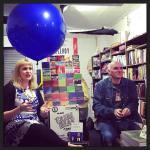
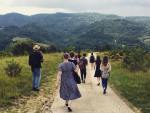
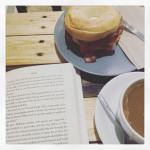

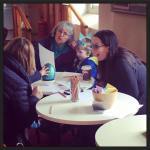
I’ve been a terrible blogger. It’s over a month since I last wrote anything on here, (closer to two, if I’m being honest). Book Festival season used to kick off in June and run through to about the end of September but every year, like the advent of Christmas, it seems to be starting earlier and earlier. This year I have been festivaling since the middle of April and, between travel and finishing up the edits on the next novel, I’ve somewhat neglected my blogging duties. Usually, I like to write up a quick account of each Book Festival I get to be part of. It helps me to remember where I’ve been, who I’ve met and what I got up to. It’s also a way of letting the festival organisers know you’ve appreciated all their hard work. I programme festivals so I know what it’s like to be on the other side of the microphone, running round like a headless chicken making sure writers are picked up from the station and fed and properly wired into the correct amps. If a festival goes smoothly people don’t tend to notice all the folks in the background working their asses off to ensure nobody notices they’re there. However, when I’ve got my, “I’m just a writer this week,” hat on, I always notice these people, because most weeks, I’m one of them.

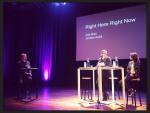
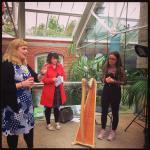


And so, I faithfully promise to blog about all the wonderful festivals I’ve been involved with in the last few weeks: Hillsborough Festival of Literature and Ideas, European Literature Nights in The Netherlands, the European Festival of the Short Story in Croatia, Newcastle Poetry Festival, (where I was blissfully just a punter, neither reading nor organising anything), and Belfast Book Festival which kicks off this week and includes our very first ever LitCrawl. It’s a bit presumptive to say I’m going to blog about something which hasn’t happened yet but I’m pretty confident that two weeks from now I’ll be absolutely knackered and waxing lyrical about what a marvellous time I’ve had at BBF. (May the weather be moderate, may the Q and A’s be semi-sensible for a change, may the cheese in the Green Room be even better than last year and may Oisin Fagan rock up in an even more lurid jumper than last year). For now, here are some lovely festival snaps and a few things I’ve learnt about running Book Festivals from the good folks who’ve hosted me so well over the last few weeks.

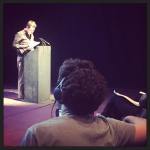


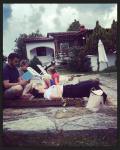
Hospitality is everything. Lots of people are now attending literary events because they want to find community and meet people. Yes, they’re interested in hearing an author read. But, if they can also meet some bookish people they didn’t know before then that’s a massive bonus. Dispensing with the traditional rows of chairs and arranging the seats around small tables, makes it easier for people to start conversations. Utilising your most friendly volunteers as welcomers who can connect people with shared interests is also a good idea. Cake also helps. It’s not just being overly nice. Attendees who find community at events are much more likely to return for others events in your programme. They may even spend money.
Treat your authors well. Good food. Good wine and a comfortable place to rest go an awfully long way towards putting a writer at ease and you are much more likely to get a good interview or reading out of someone who’s content and well slept rather than someone who’s been up all night, listening to a Hen Party kicking off in the next room over at the Travel Lodge.
Free stuff is great. Now, I’m not one to turn up my nose at a festival tote bag. Heaven knows I’ve gone on about that double gusseted wonder from Dundee Book Festival for over a year now. But branded liquor, a nice moleskin notebook, a t shirt with your favourite dead writers printed on the front: these are the sort of free gifts which are more like bribes and that’s no bad thing. Plus, with the right kind of branding, you’ll be getting some lovely free advertising for next year’s festival.
You don’t have to read in a library. Some of my favourite events of the last few months have taken place in the oddest venues: a Quaker Meeting Hall, a Victorian Green House, an underground Jazz Club, a wooden hut in the middle of a park. You need to ensure you can mic these quirky reading venues well, if people can’t hear then it doesn’t matter where you’re event is -Buckingham Palace, the tip of the Eiffel Tower, George Saunder’s living room- it’ll still be a dismal failure. However, if you have got some interesting buildings you can use, do utilise them, because you’ll be giving your audience the sort of unique experience they won’t mix up with any of the other readings they’ve previously attended. (Nb. ensure you have adequate seating for everyone attending. You don’t want audience members remembering your event because they ended up putting their back out after standing in one spot, craning their neck around a pillar for three hours).
Keep it neat. I’m writing this in Croatia, where things start late and run long. That’s just the way it is and actually, after six straight days of doing things Croatian-style I’m starting to come round to their laid-back version of a literary event. It certainly keeps things relaxed. However, I still stand by my long-held belief that no literary event need be longer than 70 minutes, (no film need be longer than 90 minutes either – Lake Placid‘s only 87 minutes and it’s an absolute classic). People get fidgetty once you’ve breached the hour mark. Keep it short and interesting and leave them wanting more. (See also: “there’s no call for more than 3 writers on a panel” and “ten minutes is more than long enough for a reading.”)
Volunteers form the foundations of every good Book Festival. Put some effort into tracking down decent volunteers; the sort who turn up early, stay late and take the initiative when something needs doing. When everything starts to go pear-shaped and you’re running on three hours’ sleep, you will thank past you for taking the time to recruit those three volunteers with a bit of sense rather than the rake of recently graduated students with cool hair who really only wanted a free t shirt and an opportunity to grab a selfie with the only well-known writer you’ve been able to afford. Make sure your volunteers have lots of pizza and beer, or tea and scones, or free biros; whatever their little hearts desire. Tell them loudly and repeatedly that they are wonderful and you hope they come back next year and possibly clone themselves in the interim.
Be creative with your budget. This one’s mostly for those of us trying to work miracles with the ever-diminishing arts budget in NI. If you’ve not got the budget for Margaret Atwood or Neil Gaiman, (and I certainly don’t), then programme great writers you can afford and present them in a slightly more creative way so your audience are getting a new experience even if they’ve heard this writer many times before. Experiment with interesting pairings. Choose a theme for the reading. Partner the writer with a musician or a different genre of writer. Put your event in an odd location. Some of these wildcard events have ended up being the most memorable I’ve ever attended.
Create space. Writers travel a lot, especially at this time of the year. Make sure people are given lots of time to rest and explore the place they’re visiting. Also, make space for your writers to spend time with each other. Writing is a weird profession. It’s lonely and sometimes baffling. The people who understand writers best are often other writers. Ensuring they have time to connect over meals and in the green space is one way to help writers make connections and find little pockets of community while they’re zipping about the festival circuit. (Wine will also really help with this process).
Befriend your bookseller. Behind every good book festival there’s a man or woman frantically carting cardboard boxes from the back of a hatchback to a trestle table and trying to get a card machine to work with zero reception. Take time to thank your bookseller. If writers can’t sell their books, there’s not much point in them coming to Book Festivals and the whole cycle of interdependency breaks down. The odd wee cup of coffee and thank you from the stage will help your bookseller to feel appreciated. If you’re feeling particularly generous you may even wish to help lug a cardboard box around.
Only work with good people. I’ve said it before. It bears repeating so I’ll say it again. Only work with good people. Programme the sort of people who turn up, on time, do what you’ve asked them to do and appear to enjoy it. If your gut’s saying “high maintenance” about a particular writer, then listen to your gut. It doesn’t matter how many tickets you think they’ll shift, if working with them gives you a three day migraine and after the festival, you can’t say their name without visibly twitching for the rest of your adult life, then it’s just not worth it. I’ve been there. I can verify that it’s not worth the hassle. I won’t be booking those writers again. If you want a list of wonderful people who are great to work with I’m happy to recommend writers. Thankfully this list is about ten times longer than the difficult list.
April 15, 2018
“My First Year As A Freelancer” or “I Thought You Said I’d Have So Much Free Time On My Hands I Wouldn’t Know What To Do With Myself.”


It is exactly one year since I quit my day job and went freelance as a writer/community arts facilitator/festival programmer/conference speaker/semi-professional political pundit/full-time job juggler. Here is a picture of me in my flamingo jumper on my last day at work. Here is a picture of me in the very same flamingo jumper just 365 days later. My hair is longer now and my eyebrows look better but I am not as tanned. (Nb. this may be something to do with the Instagram filter). I’d say I look exactly the same amount of tired in both photos.
I do not regret going freelance. It has been an amazing, if somewhat hectic year. Here, in no particular order are my favourite things that have happened since leaving work: getting to make a Radio 3 drama with Liam Neeson, visiting Norway, New Zealand and California in less than three weeks, finally making it to the end of The Sea, The Sea, signing a three book deal, programming 3 different literary festivals, becoming a roaming writer on the trains of Ireland, reading at Cheltenham Literary Festival for the first time and not messing it up, writing and performing a piece in collaboration with a string quartet, my week at the super scenic, incredibly hospitable, Dalkey Book Festival, joining a gym and being able to run for 10 minutes without stopping, publishing a book of Postcard Stories, making 3 German documentaries about Brexit, (still not sure why this happened or if I am actually considered a serious political voice in Germany), the International Literary Showcase week at Norwich Writers’ Centre, looking after Dementia Friendly screenings at the QFT, teaching my first ever university classes, visiting Katherine Mansfield’s house in Wellington, so many amazing older people’s arts projects I’ve lost count. It’s been a bit of a rollercoaster. When I flick through my photos from the last year, it feels more like a decade and yet it also feels like it was just yesterday I emerged from the Council office block, clutching a potted plant and a bunch of good intentions, ready to kick off my new life. I don’t think I’ll ever go back. I’m pretty sure the mornings would kill me now. But I have to be honest and say the transition hasn’t been plain sailing either.
As I’m spending my entire weekend writing an enormous project evaluation, (one of the perks of not being 9 to 5), I thought I’d present my first year of freelancing as a kind of report. There are no graphs, because I don’t know how to do graphs, and no mention of Section 75, but there are positives, negatives, a financial statement and some general conclusions which may help sway those of you who are thinking about giving up the day job. Think carefully before you cut up your swipe cards folks, it’s great here in the land of the freelancer, but it’s pretty hard work too. Hope this is useful.
Negatives:
The juggling is exhausting. Besides my writing I’ve consistently had around seven community arts or programming projects on the go all year. Much as I try to place boundaries on each of these projects they always seem to leak into each other. Clients contact you constantly. Everything seems urgent. It’s really hard to properly relax when your inbox is nowhere near empty and you can see the unanswered emails mounting up. It’s also quite a stretch, head wise, to be constantly jumping in and out of different projects and switching employers.
I have to say I actually miss the 9 to 5 hours. At peak times I’ve found myself working 13 hour days, 7 days a week, and still not feeling on top of things. I’d love to switch on the freelance equivalent of an “out of office” and just ignore messages but there always seems to be a pressing deadline.
Working in the arts community in Belfast means that you’re always on the job. When I go out to see a movie or play, people are constantly approaching me to ask work-related questions. This can be a bit exhausting. I really don’t want to be a bitch and I don’t think I could ever tell a person to go away but sometimes I’m definitely thinking it in my head.
The same goes for the literally 20-30 emails I get every week asking for advice on getting a manuscript published, or who I’d recommend for an arts project, or if I could advertise a gig or reading using my social media contacts, or any number of small queries. I really want to be helpful. People have been super helpful to me in the past and I have appreciated it, but I honestly spend somewhere in the region of 10 hours a week replying to these kind of requests. I can’t seem to work out how to pare this back without seeming like a horrible person. Help.
Subsection to the above point, I’ve met and worked with so many people in the last year I can’t remember their names and this is excruciatingly embarrassing when I bump into them in a coffee shop or all night Tesco. If I’ve mind-blanked on your name or called you the wrong name at some point in the last year, I’m so sorry. I’m not rude I’m just tired and a bit muddle-minded.
I’m not getting as much writing done as I thought I would. While working full time, I was averaging about 2 hours per day. I’m still managing my 2 hours but I naively thought I’d have oceans of time to sit in coffee shops reading and writing. I’m also getting behind on my Holby and Casualty, (though this might be more to do with just how dull Holby has been of late).
I’ve quickly realised that salaried people have no idea what it’s like being a freelancer. I know this because I was a salaried person last year and did not understand. Salaried people are always calling meetings and brain-picking sessions. The motivation is great and it’s always lovely to catch up over a cup of coffee but rarely does the freelance person actually get paid for any of these meetings and they can often take up a substantial chunk of the week. (See also, phone calls, press shoots, radio interviews and launches).
When I got sick and lost my voice and coughed almost constantly for nearly a month I still had to go to work or I wouldn’t get paid. This sucked.
Positives:
I actually believe in the things I am now doing. I choose to work on events and projects which I think are meaningful and so most evenings I come home, albeit exhausted, at least convinced I’ve made a little bit of a difference with my day.
I’ve been able to specialise; focusing my attention on work with older people and in the arena of books and literature. Rather than reducing my work options, specialising seems to have opened up lots of doors for me with opportunities to work on very specific projects and speak at conferences and festivals about my work.
In theory I can structure my days as I want to fit in travel, friends or an extra hour in bed if this seems like a viable use of my time. I’ve not taken enough advantage of this flexibility but I know it’s a really big positive aspect of being a freelancer.
I’m working with good people. I think this has been the biggest revelation of the last year. When you get to choose who you work with, you can choose to work with inspiring, reliable, creative people and tap into their energy. Belfast is jammed with great people and now I’m not constrained by procurement rules I can work and collaborate and dream with all of them.
Travel. Before I could really only travel at weekends and holidays or when I’d built up enough Flexi time by coming into the office at 7am and staying ’til 6:30pm. Now, I can say yes to all sorts of really amazing travel opportunities. This year I’ve been to New Zealand, Spain, Norway, America, Holland, Belgium and all over the UK and Ireland. I get to stay in nice places, meet really interesting people and not only are my expenses covered, they actually pay me to be there. This is definitely a win.
Everything I do is mine. This sounds like a bit of a moot point, and I don’t for a minute mean that I’m not keen on collaborating or working on group projects. But I do love the way the work I do is no longer swallowed up by an enormous organisation. I mostly work with small community groups and arts organisations whose contribution to the city I really value. It’s great to feel like I’m adding a little to the great work they do and even within this, I’ve really felt as if I’ve been able to establish my identity as a freelance arts programmer known for working in the arena of literature and older people. I think/hope people are starting to associate my name with a certain kind of arts work and this is really heartening.
I’m not stuck. If I don’t enjoy working in a certain area, I can easily move on to something else. The claustrophobic feeling of being tied to a place and job I start dreading every Sunday evening is long gone.
Financial Report
At the end of the first year of freelancing I’ve made a tiny little bit more than I made in my day job. However, and this is a big however, I’ve gone from working 40 hour weeks, to at least 60 hour weeks. So, if I’m being honest I’m actually making significantly less than I made before. I have managed to lower my overheads a little but I still need to work out how to stop having to work 60 hour weeks in order to make ends meet. Nobody can sustain this level of work.
Though I have a pretty much zero tolerance attitude to working for free, if I’m honest about how I spend my time about a third of it is working pro bono. I’m including all the above mentioned meetings, phone calls, promotional work and press calls in this, plus a great deal of my writing. (Though I eventually hope to find paying homes for some of the pieces I’ve been working on outside my commissioned work). This isn’t ideal but maybe it’s a necessary evil of freelancing.
I totally failed to take into consideration a lot of the hidden financial extras when going freelance. The subsistence money you spend when traveling to paying festivals and workshops. The extra mileage you do traveling to events and classes. The cost of heating and lighting the house which is now your main workspace. I have an amazing accountant who’s helping me claim back as much as possible from these expenses but they did come as something of a shock.
I have also had to learn the hard way about stretching money out and budgeting for the low pay months, (January, January, January). When you can make £4,500 one month and £125 the next, (true story), you need to get pretty good at spreading your income out. Similarly, I need to either, get better at holding on to a bit of a financial buffer or, stop destroying laptops. Let’s just say the annihilation of two MacBooks within 4 weeks, (pot of mint tea and slammed car door), made a fair dent in my very limited savings at the start of the year.
Conclusion:
Being a freelancer is hard. No one has your back. When your computer won’t connect to your printer you can’t phone the IT department and get them to sort it out. There is no one to have an office Christmas party with and sometimes people will try to pay you in wine or dinner, which is nice, but won’t work for paying off your gas bill. It can be very lonely. You will always feel tired and have a niggling feeling there’s something you should be doing. BUT it is much much better than doing a job you hate AND at least fifteen times a week, if you’re anything like me, you will feel like the luckiest person in Belfast to be getting paid to work with the most amazing people, doing the thing you love. I’m hoping the second year is easier than the first.
March 23, 2018
Happy Fifth Birthday Emma Press
[image error]
So, this blog is a little like one of those extremely well-intentioned but very late birthday cards you receive up to a fortnight after your actual birthday. The sort of card you receive in the post, open and think, thanks for the lovely sentiment, then immediately after wonder what you’re going to do with the actual card, (it being a little odd to display birthday cards two weeks after your birthday is over yet also a little heartless to drop such a lovely card straight into the recycling bin). It’s over a week since the very wonderful Emma Press celebrated their fifth birthday and the, almost miraculous achievement, of having published fifty pamphlets, books and anthologies in five years. I am that bad friend who forgot/was too busy dashing about on trains to post a card. However, I still want to tip my, somewhat belated, celebratory hat to the always inspiring Emma Wright, Rachel Piercey and all the other wonderful souls who sail in the good ship, Emma Press.
I’ve known of the Emma Press for a number of years now: ever since the publication of their tantalisingly titled collection of “Mildly Erotic Verse”, and the gorgeous job they did showcasing Stephen Sexton’s beautiful poems in his first pamphlet “Oils.” I was delighted when they agreed to publish a collection of my “Postcard Stories” last year and was really pleased to be partnered up with the illustrator Benjamin Phillips who did a stirling job of realising the concepts behind my little stories. I want to take this opportunity to thank Emma and her team for making my experience with “Postcard Stories” such a delight from start to finish. The editing process was smooth and full of way more encouragement than critique, their vision for the project was absolutely spot on from day one and at all times I felt valued as both a person and a writer who would ultimately understand the best way to present my work. I think it’s important to say just how warm and generous the Emma Press are with their writers. I had something of a difficult experience with my previous publisher and found the whole experience of working with Emma and Rachel incredibly healing, like I was being given an opportunity to remember why I’d started writing in the first place, through close contact with people who love words as much as I do.
As I got to know Emma better I was also inspired by her vision for the Emma Press. Emma has made some brave, calculated decisions about how she wants to approach publishing. She places a strong emphasis on integrity, ensuring she pays writers and staff members properly and can offer people a much-needed toe hold into the publishing industry. She champions new voices. She takes great pains to produce books which are not just powerfully written but also presented with stunning visuals and illustrations. She often goes above and beyond, sacrificing her own time and finances to support others. She takes the time to get to know her authors, celebrating with them during the high points and quickly stepping in with encouragement when encouragement is needed. Emma is a powerful champion of the small press movement and if you’re thinking of hosting a panel on small presses at your festival or conference, please consider booking her as she advocates so passionately and eloquently for small, independent presses and their vital role in the publishing industry.
So, almost one week to the day, too late, can I raise a glass of slightly chilled Rioja to Emma Wright and the Emma Press and say how delighted I am for you on this your birthday “month.” Congratulations on your first five years and all you’ve achieved with such tenacity, grace and unswerving integrity. May there be many, many more years of Emma Press publications. May the ideas never stop coming and the right writers always come stumbling into your radar. Keep going Emma. We’re all behind you. We’re very grateful for everything you’ve done. The literary community wouldn’t be the same without you.
If you want to find out more about the Emma Press or even submit to one of their calls for new writing check out their wonderful website here.


